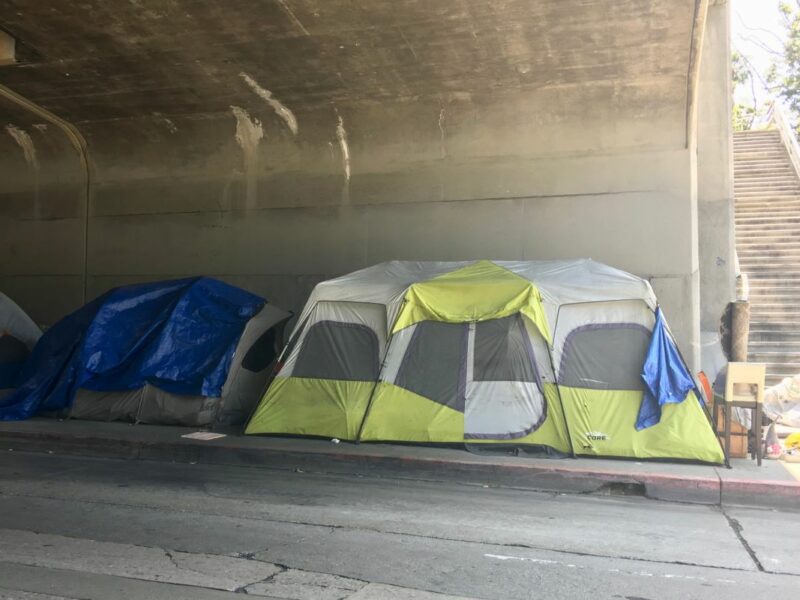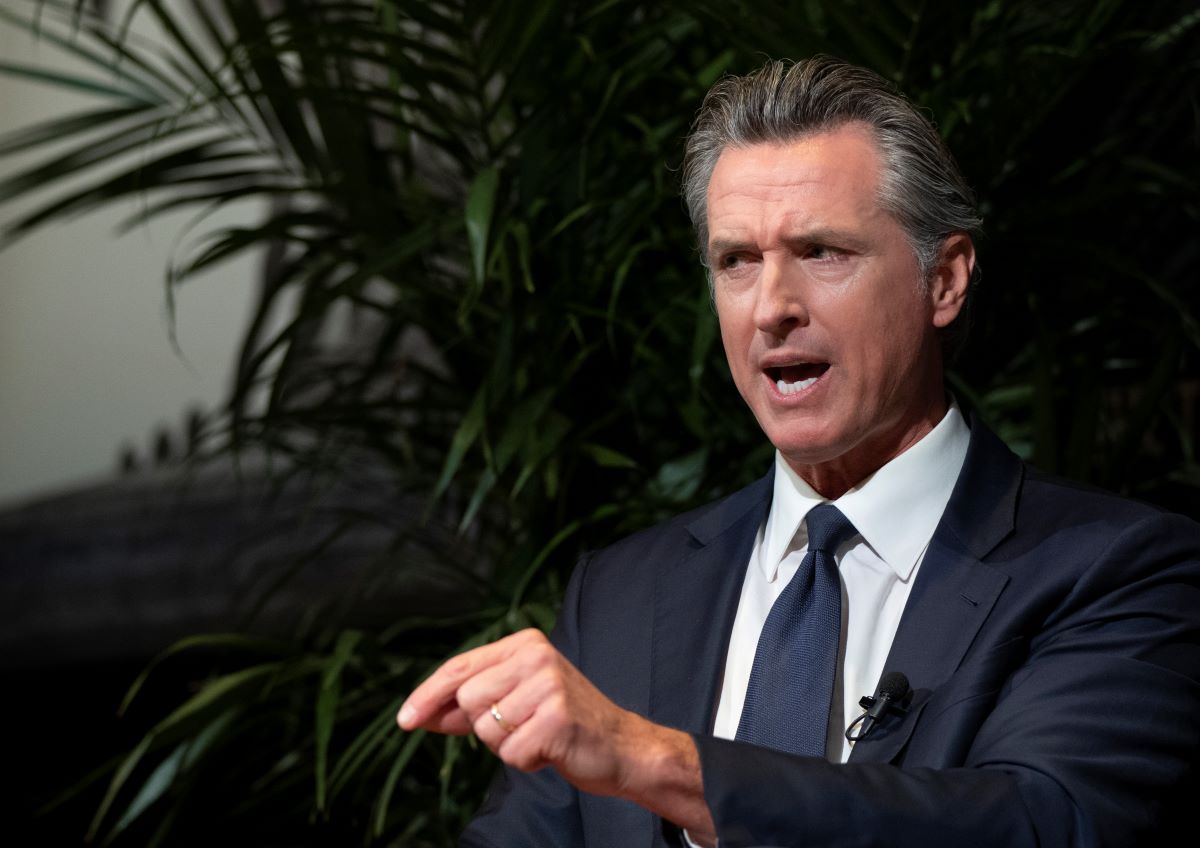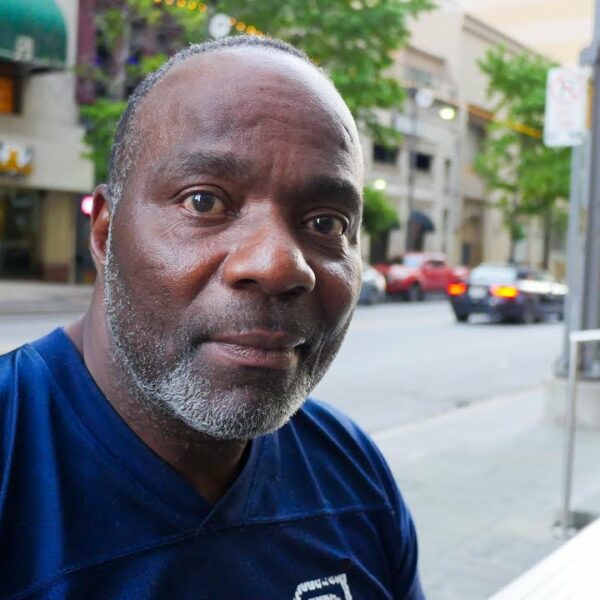California’s cities aren’t doing enough to combat homelessness, Gov. Gavin Newsom decided last week, so he’s halting $1 billion in state spending for local governments until they can come up with something better.
Newsom, a Democrat who was reelected to a second term this week, announced on November 3 that the third round of Homeless Housing, Assistance and Prevention (HHAP) grants would be withheld until new strategies that better address the state’s growing homelessness crisis were submitted to the state.
“As a state, we are failing to meet the urgency of this moment,” Newsom said. “Collectively, these plans set a goal to reduce street homelessness 2 percent statewide by 2024. At this pace, it would take decades to significantly curb homelessness in California—this approach is simply unacceptable.”
California has long treated homelessness as a local issue, pushing the responsibility for solving it onto cities and counties.
These municipalities receive billions in state tax dollars, including the recent $15.3 billion HHAP package, to design and run programs to create housing and end unsheltered homelessness.
But Newsom said the plans he’s received so far are deeply disappointing. He told LA Times columnist Anita Chabria one partnership among several municipal entities “promised to not allow homelessness in its area to grow by more than 71 percent.”
“I thought it was a typo,” he told the Times.
Newsom said he would convene a meeting of all recipients of HHAP funding—its 13 largest cities, its counties, and groups of homeless providers—later in November. According to the release from the governor’s office, applicants are expected to present plans that “[address], in detail, local actions to prevent and reduce the number of individuals experiencing homelessness at the community level. The plans must include a landscape analysis that assesses the current number of people experiencing homelessness in a given community and identify all existing programs, and all sources of funding aimed at tackling this crisis. Additionally, the plans must include outcome-driven results and strategies for achieving these goals using clear metrics to track success.”
“Everyone has to do better—cities, counties, and the state included,” Newsom said. “We are all in this together.”
Mayors Confused by Pause in Homelessness Funding; Homeless Advocates Concerned About Programs
But leaders of California’s largest cities—all Democrats like Newsom—feel otherwise.
In a statement, Los Angeles Mayor Eric Garcetti said too much of the burden has fallen on the cities.
“As a percentage of our budget, the city spends five times what the state spends on homelessness,” Garcetti said. “Despite some good steps forward from the governor and legislature in recent years, this fight is still disproportionately shouldered by local communities with far fewer resources than the state.”
Garcetti also pointed out that this wasn’t the first the state had seen of LA’s proposals.
“This is perplexing, after the city worked directly with and received positive feedback from state agencies and county partners to develop our plan,” he said.
Other municipal leaders expressed similar frustrations. Oakland Mayor Libby Schaaf said her city had also worked with the state to create their proposal, while San Jose Mayor Sam Liccardo said the state should be offering up 10 percent of its budget surplus and implied Newsom’s move was purely political.
“Let’s put down the megaphones and pick up the shovels,” Liccardo said.
Advocates, meanwhile, expressed reservations about how the funding pause would impact their clients.
“There might be some projects that are gonna be on hold,” said Genevieve Lucas-Conwell, Executive Director of the Coalition of Homeless Services Providers. “So, how do we support those projects to make sure they’re supported within this pause? Hopefully, there’s gonna be some other funding sources we can tap into.”
In a statement, League of California Cities Executive Director and CEO Carolyn Coleman said that the funding pause doesn’t make sense given the urgency of the homelessness crisis.
“Failing to release state funding will not put roofs over the heads of Californians or deliver desperately needed supportive services,” she wrote. “Refusing the delivery of these funds is the opposite of progress—if anything, it will lengthen the time it takes for unhoused residents to access the services and housing they deserve.”
She also said that the state’s failure to provide leadership puts too much of a burden on municipalities.
“Addressing the state’s homelessness crisis, including prevention, is a shared responsibility that requires a complex approach and must include all levels of government, nonprofits, and community organizations,” she wrote. “If the state is looking for a real solution to this crisis, we need a statewide plan and sustainable state funding that supports long-term planning.”
Jennifer Loving is the chief executive of Destination: Home, a nonprofit organization that works with people experiencing homelessness in Santa Clara County and the city of San Jose. In an interview with LA Times columnist George Skelton, she recognized Newsom’s frustration. But she said he has to provide some guidance if he wants cities and counties to do better.
“He’s kind of like a basketball coach telling his team they all suck without telling them what positions to play, and what plays to run,” she said. “Instead of treating counties like bad children and acting as an absentee parent, it would be better to work together to create a state plan.”













